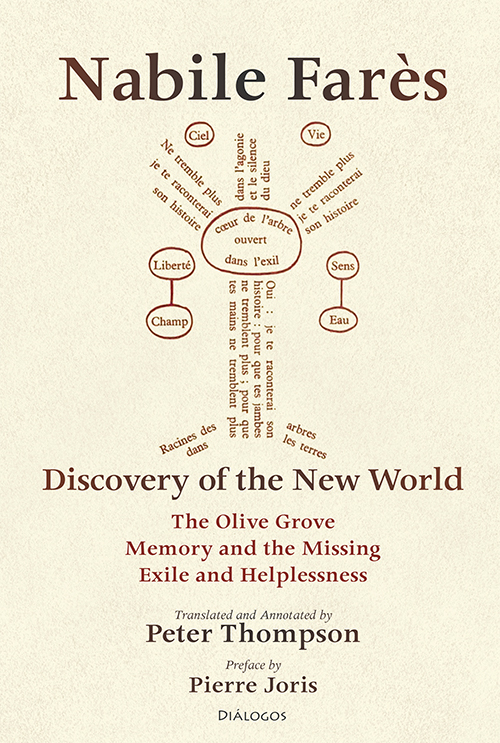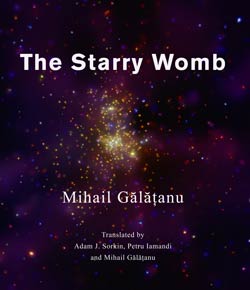Description
Discovery of the New World
(La Découverte du nouveau monde)
Nabile Farès
Translated by Peter Thompson
Preface by Pierre Joris
ISBN 978-1-944884-90-1
420 pages: $29.95
January, 2021
Discovery of the New World collects, for the first time in English, Algerian francophone writer Nabile Farès’ ambitious trilogy of novellas reflecting on the effects of French colonialism in North Africa. The trilogy includes The Olive Grove (Le Champ des oliviers, Editions du Seuil, 1972); Memory of the Missing (Mémoire de l’Absent, 1974); and Exile and Helplessness (L’Exil et le désarroi, 1976). These heavily experimental works, set in the time just before and after the Algerian war with France, probe issues of identity—race, gender, nationality—in the wake of European colonialism. Just as Algeria itself has found only the most difficult paths after independence (paths glimpsed, in all their neocolonial cynicism, in Exile and Helplessness), and just as Farès himself renounced a future in Algeria and many of his books could not, until just now, be published there, the protagonist of this work is left with loss of purpose, shadows of loved ones, and a village that will never be the same.
“The first thing that hits me every time I open or reopen one of Nabile Farès’ books,” writes Pierre Joris in the Preface, “is the immediacy of the intense struggle—simultaneously, the glorious success—of a text that stays at white heat by bending/bedding itself between what some would call the “genres” of poetry & prose.” And surely one of Farès most distinctive talents is his ability to convey the sense of political struggle by means of structural tensions within the language itself. And it takes a master translator like Peter Thompson to bring these delicate issues of style and form into English.
Praise for Discovery of the New World
In Francophone Maghrebian belles-lettres, Nabile Farès looms as the most gifted articulator of his generation of a fecund, all-encompassing poetics of love, language, identity, and politics. In Peter Thompson, Farès found his match—a talented articulator of his oeuvre in the English language. Thompson’s subtle and fluid translation is a boon to Anglophone readers and scholars alike.
—Hédi Abdel-Jaouad, author of Les Fugues de Barbarie: Les Ecrivains Maghrébins et le Surréalisme
For Farès, throughout his life, his new world was and would forever be shaped in exile; a world forever in-process, following lines of flight among the signs, words and symbols of Algeria.
—Valérie Orlando, author of The Algerian New Novel
[I]n Farès’s work the boundary no longer falls between history and individual memory but rather between punctual systems (history/memory) and multilinear or diagonal organizations that no longer refer to the eternal, or even to the historical… but to a becoming of both history and memory.
—Réda Bensmaïa, author of Experimental Nations
Farès, to me, represents the writer-as-historian much as the American poet Charles Olson had tried to define and emulate him: not as post-fact outside observer-scholar or -fictioneer, often in the pay (actual or symbolic) of the victorious party, but as one who, following the Greek etymology of the term “istorin,” acts to find out for oneself.
—Pierre Joris, co-editor of The University of California Book of North African Literature
With his wonderful translation of Nabile Farès’s Discovery of the New World, composed in an iconoclastic, fragmented, and ricocheting style, Peter Thompson has rescued the trilogy from an obscure cache of Algerian writing that was unfairly marginalized by multiple factions during the many decades of socio-cultural trauma and the consequent denial, failed reconciliation, and systemic historical amnesia that plagued Northern Africa and parts of Southern Europe. This trilogy explores the causes and the effects of that trauma as perceived by one troubled individual psyche through the multiple filters of sundry surrogate narrators. Instructive and intriguing reading!
—Eric Sellin, author of The Magic Mirror of Literary Translation—Reflections on The Art of Translating Verse
Praise for Exile and Helplessness
This translation by Peter Thompson, Professor of Modern Languages, poet, and accomplished translator. He has rendered into English the memoir of Nabile Farès, Exile and Helplessness, an important work masterfully rendering the ‘métissage,’ or hybridity, which, for North Africans, seems to be less an advantage than a difficulty anchoring in two distinct—even rival—cultures, the French and the Islamic.
–Marc-André Wiesmann, in CELAAN Review
The intensity and self-awareness in relation to its language, and its content’s existential urgency, brings Nabile Farès’ writing closer to the white heat of poetry than to the narrative leisure of the novel. This is writing as enactment and not as mere representation of something, a life, or a fact, say, historical or mental of that life. The immense pleasure in reading Farès’ work—a pleasure that comes through in Peter Thompson’s excellent translation—comes from the nomadicity of his language, thinking, doing, i.e. in what happens at any given moment all over the place—if you let it. Let it happen to you: you’ll be all the richer for it.
—Pierre Joris, author of the University of California Book of North African Literature.
“You have to learn to read between the lines of the sky, and of the tree, in the gaps that overflow with light and possibility.” Peter Thompson’s nimble and evocative translation brings to English readers the oracular intensity of Nabile Farès’s “multiple kind of speech.” Exile and Helplessness is a risky dialectic of prose and poetry, distance and rootedness, words and body, the politics of living and dying, of the female and the male, of liberation, anguish and ecstasy.
—Adam J. Sorkin







Reviews
There are no reviews yet.